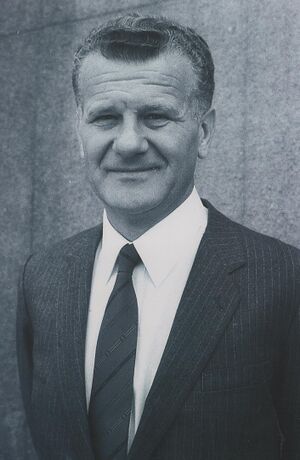Difference between revisions of "Ivan Stambolić"
(expand, de-stub) |
(Bold for name in lede) |
||
| Line 5: | Line 5: | ||
|constitutes=politician | |constitutes=politician | ||
|image=Ivan Stambolic, maj 1986.JPG | |image=Ivan Stambolic, maj 1986.JPG | ||
| − | |victim_of=assassination | + | |victim_of=kidnapping, assassination |
| − | |description= | + | |description=Retired Serbian politician killed for murky motives |
| − | }} | + | }}'''Ivan Stambolić''' was a [[Serbian]] [[politician]]. He was a prominent official of the [[Communist Party of Yugoslavia]] and the President of [[Serbia]] in the 1980s, when it was still part of [[Yugoslavia]]. |
| − | Ivan Stambolić was a Serbian politician. He was a prominent official of the [[Communist Party of Yugoslavia]] and the President of [[Serbia]] in the 1980s, when it was still part of [[Yugoslavia]]. | ||
==Background== | ==Background== | ||
| Line 30: | Line 29: | ||
In a 2003 Open Letter, Milosevic strongly denied the accusation, and demanded that his interrogation protocols should be made public<ref>http://www.slobodan-milosevic.org/news/vn082403.htm</ref>. He especially condemned the politically motivated prosecution of his family. | In a 2003 Open Letter, Milosevic strongly denied the accusation, and demanded that his interrogation protocols should be made public<ref>http://www.slobodan-milosevic.org/news/vn082403.htm</ref>. He especially condemned the politically motivated prosecution of his family. | ||
| − | |||
| − | |||
{{SMWDocs}} | {{SMWDocs}} | ||
==References== | ==References== | ||
{{reflist}} | {{reflist}} | ||
Revision as of 16:49, 25 September 2020
(politician) | |
|---|---|
 | |
| Born | 5 November 1936 |
| Died | 25 August 2000 (Age 63) |
| Victim of | • kidnapping • assassination |
Retired Serbian politician killed for murky motives | |
Ivan Stambolić was a Serbian politician. He was a prominent official of the Communist Party of Yugoslavia and the President of Serbia in the 1980s, when it was still part of Yugoslavia.
Background
Stambolić was a close political associate and personal friend of Slobodan Milosevic during the 1980s. A split between Milosevic and Stambolic took place at the eighth session of the Central Committee of the League of Communists of Serbia in September 1987. Shortly after that session, Stambolic was forced to leave the position of President of the Presidency of Serbia and withdraw from public life.
By the time of his death, Stambolic showed no signs of having any political ambitions. When he disappeared, his wife Kaca ruled out a political motive saying, "He had no enemies; he did not want to go back to politics." In semi-retirement Stambolic worked as a consultant who, using his extensive network of contacts across the former Yugoslav republics, introduced potential business partners to each other.
During the 1990s, Yugoslavia, personified by Slobodan Milosevic, was the target of an intense vilification campaign in the international press.
Official Assassination Story
Stambolic was abducted on August 25, 2000, during a jogging trip in Belgrade. Three years later, his remains were found on Fruška gora. Subsequent investigations proved that Stambolic was killed on the same day he was abducted. Four members of the Special Operations Unit and their commander, Milorad Ulemek Legija, were arrested as his killers[1].
On 18 July 2005, these men and their co-conspirators were found guilty of the murder of Stambolić and were sentenced to between 15 and 40 years in prison. The court found that the order for Stambolić's murder came explicitly from Slobodan Milosevic, as well as his wife Mira Markovic.
After the Killing
Only a month after Stambolic's abduction and assassination, Milosevic lost power in Yugoslavia, in a carefully crafted Western regime change operation during the elections. He was removed on October 5, 2000, when, under the pressure of mass demonstrations, Vojislav Kostunica, candidate for the Democratic Opposition of Serbia, took power, after having declared Milosevic's victory was due to fraud.
The Washington Post wrote "Ulemek himself is better known by his assumed wartime name, Legija, or Legion, which he acquired as a result of service in the French Foreign Legion. According to several sources, Ulemek approached Djindjic in the days leading up to the Oct. 5 street demonstrations that finally toppled Milosevic. He promised that he would not allow his troops to be used to break up the street protests, and would oppose any move by the army to crush the demonstrations. Djindjic aides now speak admiringly of Ulemek and his Red Berets as people who can still perform a valuable service to the Yugoslav state."[2]
And Legija continued his services. Out of all the policemen in Serbia, he was the one who led the operation to arrest Milosevic. [3]
In a 2003 Open Letter, Milosevic strongly denied the accusation, and demanded that his interrogation protocols should be made public[4]. He especially condemned the politically motivated prosecution of his family.
References
- ↑ https://www.independent.co.uk/news/obituaries/ivan-stambolic-36385.html
- ↑ Michael Dobbs, "In Yugoslavia, a Revolution in Limbo; As New Alliance Squabbles, Milosevic Loyalists Retain Powerful Posts," The Washington Post, November 11, 2000
- ↑ http://slobodan-milosevic.org/news/ma021609.html
- ↑ http://www.slobodan-milosevic.org/news/vn082403.htm